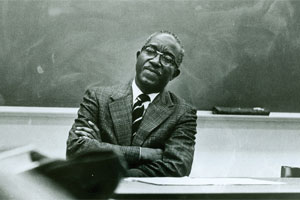Franklin wrote African Americans into country’s historical narrative
 John Hope Franklin |
|
John Hope Franklin, the John Matthews Manly Distinguished Service Professor Emeritus in History and a groundbreaking scholar on African American history, died Wednesday at Duke Hospital in Durham, N.C. He was 94.
Franklin is perhaps best known to the public for his work on President Clinton’s 1997 task force on race. But his reputation as a scholar was made in 1947 with the publication of his book, From Slavery to Freedom: A History of African-Americans, which is still considered the definitive account of the black experience in America.
“My challenge was to weave into the fabric of American history enough of the presence of blacks so that the story of the United States could be told adequately and fairly,” he said when the 50th anniversary of the book was celebrated in 1997. “That was terribly important.”
Historian Neil Harris noted, “John Hope Franklin was a giant among American historians, someone whose scholarship has forever changed our way of thinking—about African American history, about the history of the South, about the history of America.”
“He was also a warm, generous and compassionate friend, especially to students and colleagues,” added Harris, the Preston & Sterling Morton Professor Emeritus in History.
“It was hard not to feel uplifted by his mere presence. He brought together passionate commitment to his discipline, fearlessness in promoting the highest standards, tolerance for differing opinions and engagement with civic and professional responsibility.
“He remained active and involved in a world whose injustices and indignities he protested and worked against, even while producing text after text of illuminating commentary. Those of us lucky enough to have shared his University of Chicago years recall his boundless energy, his fairness and probity, and his good humor as he was simultaneously leading a department, traveling the world, running agencies, serving on commissions, giving countless lectures and offering counsel,” Harris said.
Thomas Holt, the James Westfall Thompson Distinguished Service Professor in History, said, “The world—quite literally the world—knew John Hope Franklin as the preeminent historian of the African American experience in the 20th century. Generations of younger scholars knew him as an extraordinarily generous mentor who opened doors and offered support that nourished and sustained us all. His love of the profession has bequeathed it a living legacy.”
Franklin grew up in a segregated area outside Tulsa, Okla., and was determined to overcome racial discrimination. He studied at Fisk University, where he received a B.A. in 1935, and in 1941, earned his Ph.D. from Harvard University.
He began his career as an instructor at Fisk University in 1936, and taught at St. Augustine’s and North Carolina College for Negroes (now North Carolina Central University), both historically black colleges.
In 1945, Alfred Knopf approached him about writing a book on African American history—originally titled From Slavery to Freedom: A History of American Negroes—and he spent 13 months writing it.
Then in 1947, he took a post as a professor at Howard University, where, in the early 1950s, he helped Thurgood Marshall prepare the brief that led to the historic 1954 Brown v. Board of Education decision.
In 1956 he became chairman of the previously all-white history department at Brooklyn College.
He joined Chicago’s history faculty in 1964 and served as chairman of the department from 1967 to 1970. While at Chicago, he accompanied the Rev. Martin Luther King Jr. on the 1965 march from Selma to Montgomery, Ala.
Franklin joined the Duke faculty after his retirement from Chicago in 1982.
He retired from the history department at Duke in 1985, then spent seven years as professor of legal history at Duke Law School.
Franklin won scores of awards in his career, including the 1995 Presidential Medal of Freedom. He also received honorary degrees from more than 100 colleges and universities.
Franklin was a prolific writer who also wrote The Emancipation Proclamation, The Militant South, The Free Negro in North Carolina, George Washington Williams: A Biography, A Southern Odyssey: Travelers in the Antebellum North, and Reconstruction after the Civil War. He also has edited many works, including a book about his father called My Life and an Era: The Autobiography of Buck Colbert Franklin, with his son, John Whittington Franklin. Franklin completed his autobiography in 2005.
![[Chronicle]](/images/sidebar_header_oct06.gif)